https://www.stepswithhorses.org

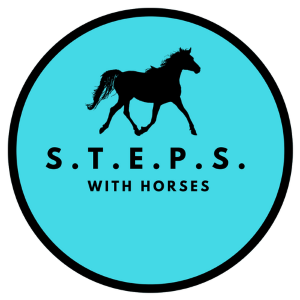
STEPS With Horses
16151 US Hwy 377-South
FORT WORTH, TX 76126
Mailing Address:
5212 Concho Valley Trl
FORT WORTH, TX 76126
Phone: 682-219-8733
MAKE AN INQUIRY
View our WEBSITE
EIN: 81-5367560Founded: 2017
Profile Last Updated December 26, 2025
Public Charity
Click here to view listing(s) of the program horses we are seeking

The Guardian Seal of Transparency is awarded annually to recognize an organization's commitment to transparency and accountability by their willingness to make comprehensive data about their programs, horse care practices, and governance available for public scrutiny. The Guardian Seal of Transparency is NOT an endorsement.
Last Updated: October 11, 2025
STEPS With Horses has not attained the Guardian designation for 2026.

MISSION & PROGRAMS
Mission:To improve the mental health and well-being of military service members and family members, at-risk youth, and others with mental health needs through equine assisted mental health services including counseling and psychotherapy, therapeutic activities, education, community engagement, and research.
Our organization conducts Equine Assisted Services in accordance with the EQUUS Foundation Guidelines on Qualifications of Organizations Conducting Equine Assisted Services (EAS).
Our organization provides outreach and/or public education programs involving horses.
100% of our total programs and services are equine-related.
Our organization is directly responsible for the care and shelter of equines involved in our programs.
Our organization does not CURRENTLY use satellite, overflow, foster, and/or outreach facilities.
Please describe what steps your organization takes to ensure that:
1) all interactions between your equines and people are mutually beneficial and conducted in accordance with the Guidelines for Human-Equine Interactions stated below;
2) all equines in the care of our organization and/or equines that participate in the organization's program have access to clean drinking water at all times; nutritious food in sufficient quantity, including natural forage such as pasture grass and/or hay; appropriate veterinary, farrier, and dental care; shelter and protection from the weather; sufficient safe space to move around comfortably on a daily basis; and daily opportunity to freely interact and have contact with other equines:
At STEPS, we place a strong emphasis on the well-being of both our clients and our equine partners. Our commitment to maintaining mutually beneficial interactions is upheld by strictly adhering to PATH Intl. Standards for equine workloads, care, and safety. These standards are integral to ensuring that our programs and activities respect the comfort and dignity of the equine as a sentient partner. To ensure appropriateness for participation, all equines are screened according to PATH Intl. Standards, taking into account their temperament, training, and health. Continuous monitoring is conducted throughout their involvement to ensure their ongoing well-being.
Our approach to equine assisted counseling follows the Relational Equine-Partnered Counseling and Equine-Partnered Play Therapy models. These methodologies emphasize the equine's sentience and self-directedness in participating in sessions. Equines are given the autonomy to "say no" to activities, and their feedback is thoughtfully incorporated into the session or lesson. This approach ensures that the equines are never treated as mere objects of control but as equal partners whose behaviors and feelings are recognized and honored. Most of our sessions take place in the pasture, the equines' natural environment, allowing them continuous access to food, water, shelter, and social interactions with the herd.
Our equine specialists, all of whom are either PATH Intl. credentialed Equine Specialists in Mental Health and Learning (ESMHL) or ESMHLs-in-training under the supervision of a credentialed ESMHL, play a crucial role in maintaining the welfare of the equines. They are trained in a research-based understanding of equine ethology, enabling them to facilitate ethical interactions and avoid anthropomorphizing. The equine specialist’s responsibilities include anticipating potential stressors, identifying signs of stress, managing any stress that arises, and setting boundaries to protect the equine’s well-being.
For therapeutic horsemanship lessons, we use the Relational Equine-Partnered Riding approach. This method focuses on understanding equine behaviors from the equine’s perspective and resolving difficulties without using dominance techniques. Lessons are conducted by PATH Intl. Certified Therapeutic Riding Instructors (CTRI) or CTRIs-in-Training, ensuring that participants learn riding and horsemanship in a respectful and ethical manner.
Regarding the daily care of our equines, each equine’s diet is individually determined by our equine manager and is detailed on a chart for feeding personnel. Additional charts are used to track the quantity of food consumed at each feeding by each equine, ensuring that their nutritional intake is monitored in real-time. Equines undergo daily assessments, with their body condition, injuries, and illnesses recorded on a daily log sheet. They receive routine veterinary, dental, and farrier care in line with best practices. Our equines live in the pasture within the herd and have access to loafing sheds for shelter. Stalls are available in the barn for equines who are ill or injured.
In summary, STEPS ensures that the interactions between equines and people are mutually beneficial and conducted with the highest standards of care and respect. Our programs are designed to be safe and stress-free for the equines, with their individual welfare as a paramount concern. Our trained personnel are dedicated to maintaining the physical and emotional safety of our equines, ensuring that all interactions are conducted ethically and respectfully.
Equine Assisted Services (EAS) Overview:
Overview of our programs involved with providing EAS to individuals with special needs:
STEPS offers a spectrum of equine assisted mental health services including equine assisted counseling (EAC) and therapeutic riding. Equine assisted counseling is our cornerstone service and is form of professional counseling facilitated by licensed mental health professionals (or graduate interns supervised by licensed professionals) and equine professionals, such as PATH Intl. ESMHLs or ESMHLs-in-Training under the supervision of a PATH Intl. ESMHL. Just like other forms of counseling or psychotherapy, EAC focuses on lessening symptoms or disorders. It can also help people cope with life’s challenges and experience a greater sense of meaning in their lives. Interaction with equines is used in conjunction with a variety of best practice counseling techniques and interventions such as trauma processing, psychoeducation, cognitive behavioral strategies, behavioral interventions, problem exploration, motivational interviewing, mindfulness, and grounding skills, play therapy, and more. We offer a specialized form of play therapy which incorporates equines for young children. Equines notice many cues indicative of a person’s emotional state such as breathing rate, heart rate, body language, facial expressions, tone of voice, and even scent. The feedback they provide can assist clients in gaining insight into thoughts, feelings, and behaviors as they are happening in the moment. Our counselors help clients connect these experiences to challenges they may be facing. In addition, clients have the opportunity to practice different skills such as problem-solving, decision-making, calming skills, and communication skills that can be generalized and applied to increasing satisfaction in relationships and daily life.
We serve adults, adolescents, and children starting at age 4. We work with both military and non-military clients to address concerns such as trauma, PTSD, anxiety and stress management, depression and mood disorders, bullying and self-esteem issues, grief and loss, military readjustment, school and work-related problems, attention deficit/hyperactivity, relationship problems, and child behavior issues. Our services may be especially beneficial for clients who are uncomfortable or dissatisfied with office-based approaches.
After clients have met and/or made considerable progress towards treatment goals, they may have the opportunity to participate in our non-clinical therapeutic horsemanship services such as riding in order to build upon and maintain the gains made in counseling. Our non-clinical services shift the focus from therapy to learning horsemanship and riding in a therapeutic environment with our highly trained and certified equine professionals. Clients can also maintain contact with their counselor through engagement in quarterly mental health check-ins. STEPS equine professionals also regularly consult with STEPS licensed mental health professionals to provide horsemanship services that are responsive to client's needs and to identify early warning signs of client regression related to their mental health. All therapeutic horsemanship facilitators are PATH Intl. CTRI or CTRI-in-Training supervised by a PATH Intl. CTRI.
Equine assisted learning (equine assisted wellness) services in personal and/or professional development are led by licensed mental health professionals and graduate-level counseling interns under supervision working with PATH Intl. ESMHLs (or ESMHLs-in-Training) to target social and emotional learning goals such as leadership skills, communication, confidence, emotional regulation, empathy, problem-solving skills, and stress management. These programs are conducted with youth and adult groups from local schools, agencies, corporations, and other nonprofits.
Equine Assisted Services (EAS) and Providers:
Our organization provides the following Equine Assisted Services (EAS):
Adaptive/Therapeutic Riding
Adaptive/Therapeutic Unmounted Horsemanship
Psychotherapy/Counseling
Equine-assisted Learning in Personal Development
4: Total number of Equine Assisted Service Providers at STEPS With Horses
1 Alexandra E. Ryan
FACILITY PARTICIPATION:
STEPS With Horses
RELATIONSHIP: Employee
SERVICES PROVIDED:
Psychotherapy/Counseling
DEGREES, LICENSES AND/OR CERTIFICATIONS
Alexandra holds a MEd in Education Counseling and is a Licensed Professional Counselor (Texas - 92370)
2 Dr. Hallie Sheade
FACILITY PARTICIPATION:
STEPS With Horses
RELATIONSHIP: Employee
SERVICES PROVIDED:
Adaptive/Therapeutic Riding
Adaptive/Therapeutic Unmounted Horsemanship
Psychotherapy/Counseling
Equine-assisted Learning in Personal Development
DEGREES, LICENSES AND/OR CERTIFICATIONS
Dr. Sheade holds a PhD in Counseling from the University of North Texas and a MS in Professional Counseling from Georgia State University. She is a Licensed Professional Counselor Supervisor (LPC-S #67848) in Texas and Registered Play Therapist Supervisor (RPT-S). She also holds credentials from Professional Association of Therapeutic Horsemanship International (PATH Intl.) as a Certified Therapeutic Riding Instructor (CTRI-75331) and Equine Specialist in Mental Health and Learning (75331). Dr. Sheade is a qualified EAL provider as an LPC-S and as a PATH Intl. ESMHL. Dr. Sheade is endorsed by PATH Intl. as a PATH Intl. Associate Faculty Member (Mental Health) for the ESMHL Workshop and Certification.
3 Elizabeth Vasseur
FACILITY PARTICIPATION:
STEPS With Horses
RELATIONSHIP: Other
SERVICES PROVIDED:
Psychotherapy/Counseling
Equine-assisted Learning in Personal Development
DEGREES, LICENSES AND/OR CERTIFICATIONS
Elizabeth is currently pursuing a masters degree in Clinical Mental Health Counseling from Southern Methodist University to become a Licensed Professional Counselor. Elizabeth is currently a graduate-level counseling practicum student practicing under the supervision of SMU professor, Dr. Tracy McClung, and onsite supervisor, Dr. Hallie Sheade, as part of Elizabeth's completion of her practicum requirements for her graduate degree. Elizabeth is an unpaid intern.
4 Tressa Marr
FACILITY PARTICIPATION:
STEPS With Horses
RELATIONSHIP: Other
SERVICES PROVIDED:
Psychotherapy/Counseling
Equine-assisted Learning in Education
DEGREES, LICENSES AND/OR CERTIFICATIONS
Tressa holds a MA in Schooling Counseling. She is currently pursuing a masters degree in Clinical Mental Health Counseling from Amberton University to become a Licensed Professional Counselor. Tressa is currently a graduate-level counseling practicum student practicing under the supervision of Amberton professor, Dr. Ken Johnson, and onsite supervisor, Dr. Hallie Sheade, as part of Tressa's completion of her practicum requirements for her graduate degree. Tressa is an unpaid intern.
Outreach and/or Public Education:
STEPS Executive Director, Dr. Hallie Sheade, frequently presents a local, state, national, and international events and professional conferences on topics related to equine assisted services. Dr. Sheade also serves as a guest lecturer for university courses. STEPS hosts groups onsite from local agencies, nonprofits, schools, and organizations to share information on STEPS’ equine assisted mental services through hands-on experiential activities with the equines. STEPS also hosts volunteer days for local schools and corporations to support STEPS through service activities. STEPS will bring out miniature equines for community outreach events, such as fundraisers, city events, and learning events. STEPS has a robust undergraduate and graduate-level internship program, hosting interns interested in learning about equine assisted mental health services from universities throughout the country. Finally, STEPS also hosts professional trainings for mental health professionals and equine professionals seeking to learn more about equine assisted mental health services.
Research/Medical Use of Equines:
Our organization has made equines available for research studies or medical training.
Please explain where and for what purpose equines are/were provided to use in research or medical training.
In the future, our equines may be considered for participation in research specifically focused on the human-animal bond and equine assisted mental health services. These studies would not involve any invasive procedures or procedures that would cause pain or suffering to the equines. The primary purpose of their participation would be to contribute valuable insights into the positive impacts of human-animal interactions on mental well-being.
All proposed studies involving equines would be subject to rigorous ethical oversight. Prior to implementation, each study would undergo thorough review and approval by an Institutional Review Board (IRB) to ensure compliance with ethical standards and the protection of both human and equine participants. Additionally, the study protocols would be reviewed by a qualified equine veterinarian to ensure the well-being and humane treatment of the equines involved in the research. This commitment to ethical oversight and animal welfare aligns with our dedication to conducting responsible and impactful research in the field of the human-animal bond and equine assisted mental health services.
Religious Affiliation:
Our organization does not promote religious education, religious purposes, or a specific religious faith or use donations for religious education or religious purposes; require participants to be of a certain faith; require participation in religious, instruction, activities or services; or require participation in prayer, worship, religious instruction or other religious activities as a condition of receiving social or secular services offered.
Auction Donation:
Our organization has never allowed, or would not consider allowing, an equine to be sold, transferred, released, or otherwise placed into possession of any person or organization that would cause or allow the equine to be sold at auction for slaughter.
POLICIES: INTAKE, ASSESSMENT & TRAINING
Prior to a horse being accepted and/or arriving at the facility, the organization has the following policies in place:The owner of a potential equine is interviewed over the phone or in person prior to seeing the equine
The equine is evaluated at its place of residence
The owner completes an application/contract which constitutes the agreement between the owner and our organization when the equine is acquired from the equine's owner other than by seizure or by abandonment
If health records are not available or are out-of-date, our veterinarian will administer appropriate vaccinations
A health certificate signed by a veterinarian and dated no more than seven days prior to arrival is provided to our organization either prior to or upon arrival of the equine attesting to the health status of the equine
The owner is financially responsible for the shipping of the equine to and from the organization
Trial Period: Check all that apply:
Equines are on trial up to 60 days
The trial period may be reduced based on the equine's progress
During the trial period, the organization accepts financial responsibility for the care of the equine, including board, feed, shoeing and any necessary veterinary care, up to a fixed amount agreed upon by the organization and the owner
Equines are on trial for up to 30 days
Equines are on trial for 60 or more days
During the trial period, the organization accepts total financial responsibility for the care of the equine, including board, feed, shoeing and any necessary veterinary care
During the trial period, the owner/donor is financially responsible for the care of the equine, including board, feed, shoeing and any necessary veterinary care
The trial period may be terminated by either the organization or the owner for any reason
Upon intake, the organization has the following quarantine policy in place:
The equine is confined to a designated and separate area for isolation and quarantine at the facility for a prescribed period of time
The equine is confined to a designated and separate area for isolation and quarantine off-site for a prescribed period of time
The equine is not quarantined
The typical length of quarantine is: 10 to 20 days
Following arrival of the equine at the facility, the following is performed:
Physical examination to include temperature, pulse and respiration by a trained staff member upon arrival
A Henneke Body Conditioning Score or other body conditioning score is assigned by a trained staff member upon arrival
Photographs are taken of each equine upon arrival at the facility and kept with the equine's health records
Physical examination to include temperature, pulse and respiration by a veterinarian upon arrival
A Henneke Body Conditioning Score or other body conditioning score is assigned by a veterinarian upon arrival
Physical examination by a farrier
Physical examination by a dentist
The equine is microchipped if the equine has not been microchipped
Horses are assessed for following skills and behaviors:
Retrieval from a pasture/paddock
Leading with a halter and lead rope
Temperament, disposition and attitude, such as rated from very calm to very high spirited
Saddling
Bridling
Lunging
Loading onto and unloading off a trailer
Mounting and dismounting
Riding at the walk
Riding at the trot
Riding at the canter
Riding by a beginner and/or unbalanced rider
Tolerance to unusual objects and loud noises
Known vices, i.e., cribbing, biting, kicking, weaving, stall walking, etc
Grooming
Bathing
Tolerance to multiple handlers at the same time
Jumping
Driving (Pulling a carriage)
Clipping
Our organization has the following policies and procedures in place pertaining to the ongoing assessment of horses in its care:
Physical examination by a veterinarian at least annually
The Henneke Body Condition score or other body conditioning score is updated at least annually by a trained staff member
Vaccinations are administered at least annually
Photographs are taken of each equine annually and kept with the equine's health records
Equines at our facility may be treated by an equine chiropractor
Equines at our facility may be treated by an equine acupuncturist
Equines at our facility may be treated by an equine massage therapist
Equines at our facility may be treated by an equine nutritionist
The Henneke Body Condition score or other body conditioning score is updated at least annually by the veterinarian
Photographs are taken of each equine monthly and kept with the equine's health records
Our organization has the following policies and procedures in place pertaining to the weight-carrying or workload capabilities of horses/equines that are ridden in our care:
Our organization evaluates the weight-carrying and workload limitations for each equine that is ridden at least annually
Our organization maintains a written record of the weight-carrying and workload limitations for each equine that is ridden
Our organization does not evaluate the weight-carrying and workload limitations for each equine that is ridden
No equines are ridden; not applicable
The following variables are considered in determining the weight-carrying and workload limitations for each equine that is ridden:
Equine age, weight, breed, body condition, fitness, balance, health and soundness
Equine conformation to include the top line, length of back, strength and width of loin, bone density (measured by the circumference of the cannon bone just below the knee)
Size, shape, condition and angle of the hooves
Participant weight, height, body proportions, balance, fitness and riding skills as well as behavioral issues and safety concerns
Weight and proper fit of the saddle and other equipment
Terrain and footing in the working environment
Duration and frequency of working sessions, as the frequency with which an equine is subjected to maximum weight carrying and/or workload
Nature and pace of work, repetitive or varied, radius of turns, degree of incline and regularity of footing when equine is subject to maximum weight-carrying capacity
Temperature and/or weather conditions
Seasonal impact on the equines' workload and weight-carrying capabilities and limitations
Our organization does not evaluate the weight-carrying and workload limitations for each equine that is ridden
No equines are ridden; not applicable
Horses provided formal training (groundwork or riding): Weekly
Additional information about our intake, assessment & training policies and practices:
Quarantine is dependent upon where the equine is coming from and upon vet's recommendation. STEPS' agreement with owner donating an equine is that the owner agrees to take equine back during the trial period if equine is found to be unsuitable for STEPS.
POLICIES: BREEDING
The organization has the following policies related to breeding and stallions:Our organization does not conduct breeding of equines owned or under the care of our organization.
The main facility where our organization conducts its programs does NOT breed equines.
One or more of the facilities where our organization conducts its programs, including foster/temporary care facilities, are permitted to house stallions
One or more of the facilities where our organization conducts its programs, including foster/temporary care facilities, breeds equines
Additional information about our breeding policies and practices:
The ranch where we board does board stallions. However, we do not include stallions in our program or in our pasture. Clients are not permitted to engage with any non-STEPS equines.
POLICIES: EUTHANASIA
The organization has the following policies related to euthanasia:Our organization will never have an equine euthanized for space
Our organization will have an equine euthanized upon the recommendation of the veterinarian if the equine is a threat to itself, other equines, or people
Our organization will have an equine euthanized upon the recommendation of the veterinarian after all reasonable treatment options have been explored
Euthanasia is done on site when possible to decrease trauma from transport
Euthanasia is done at the veterinarian's facility
Disposal of the carcass is handled within 24 hours
Our organization will never have an equine euthanized under any circumstances
The following are authorized to administer the procedure for your organization in accordance with state laws:
Veterinarian
Employee of animal control shelter or humane society with appropriate training
A certified euthanasia technician
Senior staff with appropriate training
Veterinary student under the supervision of a licensed veterinarian
Not applicable. Our organization prohibits euthanasia under any circumstances
Additional information about our euthanasia policies and practices:
Due to our extensive interviewing process for an equine to be accepted into the program, the only time a healthy equine, who becomes unsafe, would be euthanized is if there was not a safe home for it to go to. We would rather put an equine down that is unsafe, than have it end up in a slaughter house or hurt or kill a human. This would only be considered after all other resources for training and/or re-homing have been exhausted.
POLICIES: RE-HOMING
View Re-homing AgreementOur organization has the following re-homing (adoption/purchase) policies and procedures in place:
All potential adopters/purchasers complete a written contract which constitutes the agreement between our organization and the new owner
Our organization does NOT re-home an equine to first time equine owners
Our organization will only re-home an equine to a location where another equine resides
Potential adopters/purchasers must visit our organization and be observed with the equine on site
The distance of a potential adopter/purchaser's home from our facility is a consideration for when re-homing an equine
Our organization conducts a site visit of the adopter/purchaser's facility before the transfer of the equine to the adopter/purchaser's facility
Potential adopters/purchasers are encouraged to do a short-term, on-site foster with the equine
Adopters/purchasers are NOT required to provide updates
Our organization has the following policies and procedures related to horses that need to be retired, are no longer able to contribute to the mission of the organization, and/or are no longer manageable:
Equines may remain at our organization for their lifetimes
Equines may be found suitable homes by our organization
Equines may be returned to their owners
In the case an equine is unmanageable and demonstrates repeated dangerous behaviors, the equine may be euthanized upon the recommendation of the veterinarian
In the case an equine is unsound and/or unhealthy and cannot be treated to relieve suffering, the equine may be euthanized upon the recommendation of the veterinarian
The organization will accept financial responsibility for equines in the current care of the organization that need to be retired or are no longer able to contribute to the mission of the organization if all alternatives have been explored to find the equine an appropriate placement and space is not available for the equine to remain at the organization.
Equines may be sent to auction
If a suitable home cannot be located within 12 months, the equine may be euthanized
The uploaded Re-homing agreement includes the following re-homing (adoption/purchase) statements:
The agreement reflects that any individual or organization in possession of the equine as of the date of the agreement and any time thereafter is bound to not sell the equine at auction for slaughter or allow the equine to be sold, transferred, released, or otherwise placed into possession of any person or organization that will cause or allow the equine to be sold at auction for slaughter.
The agreement states that should the adopter decide to re-home the equine, our organization must grant approval of any individual or organization intending to take possession of the equine for any reason prior to the equine being placed into the possession of such individual or organization, including being provided written notification of the name, address, and telephone number of any individual or organization intending to take possession of the equine for any reason.
The agreement states that the terms of our organization's agreement will be binding on any future individual or organization taking and/or in possession of the equine for any reason.
The agreement states that re-homed equines cannot be bred
The agreement states that if there is any breach of contract the equine must be returned to our organization
The agreement states that our organization reserves the right to make unannounced visits
The agreement states that our organization reserves the right to make scheduled visits
The agreement states that adopters/purchasers can return an equine to our organization free of charge
The agreement states that adopters/purchasers are required to provide updates (photos, vet records) for as long as the adopter/purchaser is responsible for the care of the equine
The agreement states that the re-homed equine CANNOT be sold, adopted, transferred, auctioned, released, given away, or otherwise placed into the possession of another individual or organization under any circumstances and must be returned to our organization should the adopter decide that he/she is no longer able, or no longer wishes, to care for the equine.
The agreement states that should the adopter decide to re-home the equine, the adopter must grant the organization first right of refusal prior to the equine being placed into the possession of any individual or organization intending to take possession of the equine for any reason.
The agreement states that should the adopter decide to re-home the equine, our organization must be notified of the name, address, and telephone number of any individual or organization intending to take possession of the equine for any reason prior to the equine being placed into the possession of such individual or organization.
The agreement states that adopters/purchasers can return an equine to our organization for a fee
The agreement states that adopters/purchasers are required to provide updates (photos, vet records) for one year
The agreement states that adopters/purchasers are required to provide updates (photos, vet records) for two years
Our organization microchips all equines that are not already microchipped before the adoption and/or transfer of the equine if the organization has the authority to microchip the equine.
The agreement includes the microchip number of the equine.
None of the statements are included.
The organization does not re-home equines under any circumstances; our organization retains custody of our equines and ensures care of the equines for their lifetimes.
Our organization does not have the authority to transfer ownership and/or does not own any of the equines involved with our programs.
Our organization requires references from the following:
Veterinarian
Farrier
Personal/Other
Not applicable or no references required.
Transfer of ownership occurs: Immediately (at the time of adoption/purchase) or less than one year
The average equine re-homing (adoption/purchase) fee received by your organization:
Less than $200
EQUINE CARE & SHELTER/FACILITY INFORMATION
Our organization does not CURRENTLY use satellite, overflow, foster, and/or outreach facilities.Total facilities at which our organization cares for and shelters horses used in our programs: 1
STEPS With Horses
16151 US Hwy 377-South Fort Worth TX 76126
Currently operational
Total number of horses/equines currently involved with your programs, under your care, and/or owned by your organization at this facility: 11
Total number of horses at this facility NOT INCLUDING those counted above: 90
Maximum capacity of horses at this facility: 110
Does your organization own, lease or use a part of this facility? Use
Provide the contact information for the individual or organization responsible for investigating abuse in the county where the facility is located, including mailing address, email address, and phone information.
Texas Family Department of Family and Protective Services Region 3 Arlington, TX 1200 E. Copeland Rd., Arlington, TX 76011 817-792-4400 Contact Form website (no email): https://www.dfps.state.tx.us/Contact_Us/default.asp Weatherford/Parker County Animal Control 403 Hickory Lane Weatherford, TX 76086 animal.control@parkercountytx.com 817-598-4111 https://www.parkercountytx.com/96/Animal-Control-Lost-Pets-Notices-of-Estr
Does your organization conduct Equine Assisted Services (EAS) at this facility in accordance with the EQUUS Foundation Guidelines on Qualifications of Organizations Conducting Equine Assisted Services (EAS)? Yes
Total number of Equine Assisted Service Providers AT THIS FACILITY, including instructors, specialists, therapists, counselors, coaches and/or facilitators (full-time, part-time, volunteer, independent contractors, and/or providers accompanying clients) that conduct Equine Assisted Services (EAS) in accordance with the EQUUS Foundation Guidelines on Qualifications of Organizations Conducting Equine Assisted Services (EAS) AT THIS FACILITY: 4
Equine Assisted Service Providers Assigned to this Facility: (see Equine Assisted Service Provider Section below for details)
1. Alexandra E. Ryan
2. Dr. Hallie Sheade
3. Elizabeth Vasseur
4. Tressa Marr
We lease a private pasture space that we feed and share pasture maintenance with the ranch. We share space in the barn and arenas with the ranch and its boarders. STEPS equines live in our privately leased pasture in a closed herd at all times with fence lines that are not shared with other equines boarded at the facility. We reserve two stalls in the barn for STEPS' exclusive use in order to temporarily house any equines with illness, injury, or sensitivity to extreme weather conditions. These stalls have STEPS' information posted at all times and are updated with the name and feeding requirements for any specific equines housed in the stalls temporarily. Our reserved stalls (if used) have solid walls and do not allow for contact between our equines and other equines boarded at the facility.
STEPS With Horses maintains its own fire extinguishers in the shed adjacent to the pasture where our equines are kept, as well as a second fire extinguisher and smoke/carbon monoxide alarm in our office. These fire extinguishers were purchased and approved by an individual with advanced training in fire safety. The facility does not have its own fire extinguishers, alarms, or sprinkler systems. Regarding the prohibition of smoking, all of our clients, staff, and volunteers are provided with copies of STEPS' facility rules and agreement (a STEPS document, not a 4 Hearts document), indicating that smoking is not allowed. We would notify the barn owner when non-STEPS visitors/boarders are smoking if this were to ever happen but cannot intervene directly with their clients/visitors. (It has not happened since we have been there).
STEPS maintains a written plan in place for pasture management, which includes guidelines for seeding, fertilizing, irrigation, mowing, dragging, harrowing, manure removal, removal of debris, the control of poisonous plants, and a schedule for cleaning for the extent of what we can control in a pasture that does not belong to us. We seed the pasture, remove manure as needed, remove debris, and remove weeds to the capacity that we are allowed to do so.
The horses are all fed at the same time. All have separate buckets and are physically separated (feed bags, tying, etc) if needed to ensure that each receives the correct amount of grain.
Veterinarian Information: STEPS With Horses (*Main) Currently operational
Veterinarian: Dr. Cal Davis
Clinic Name: Reata Equine Hospital
6516 Granbury Hwy
Weatherford TX 76087
Phone: 817-599-9635
Grounds: STEPS With Horses (*Main) Currently operational
Total acreage dedicated specifically to the horses: 70
Our organization has use of the following at this facility:
Structures/Barns: 2 Run-in sheds: 3
Pastures: 6 Paddocks/Pens/Turnout Areas: 8
Uncovered Outdoor Rings: 9 Covered Outdoor Rings: 0 Indoor Rings: 0
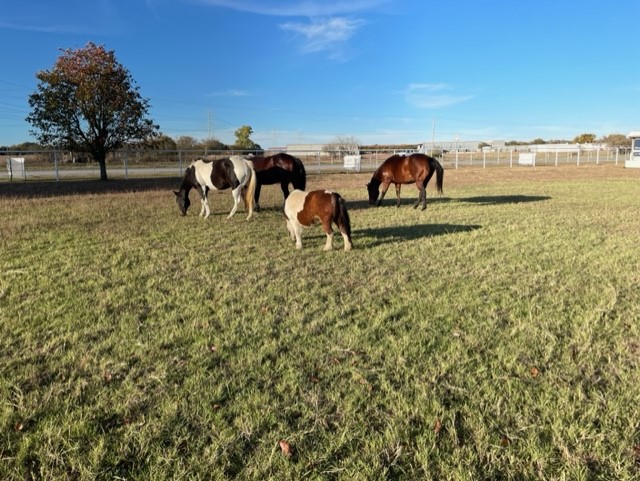
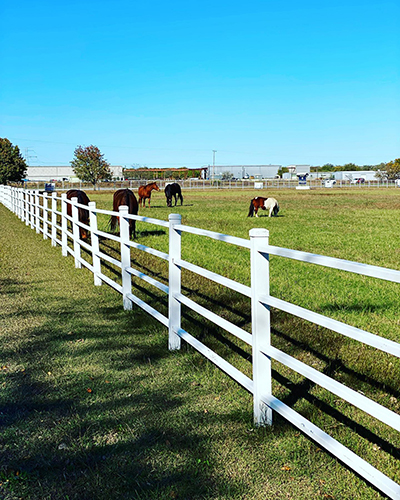
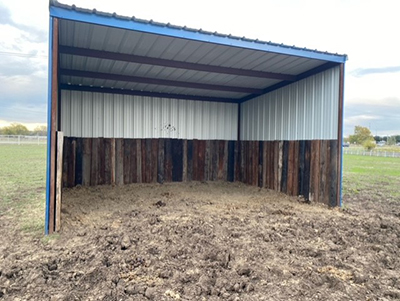

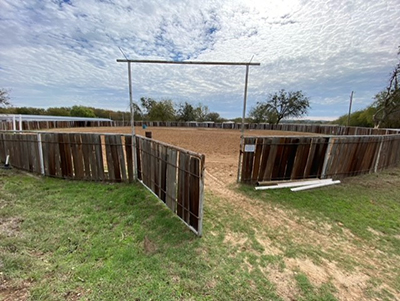
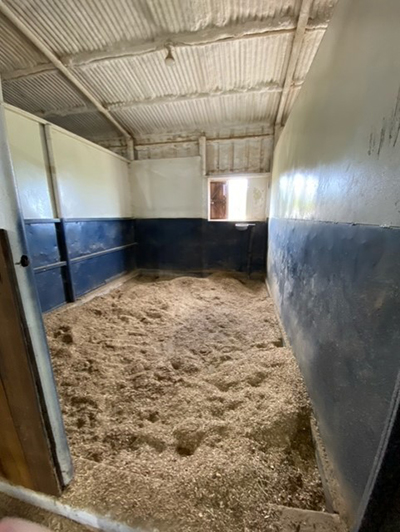
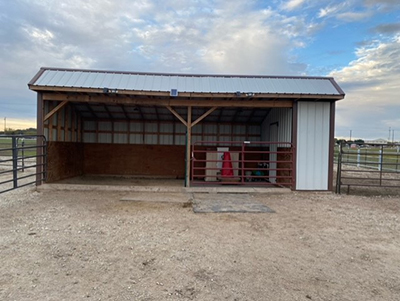
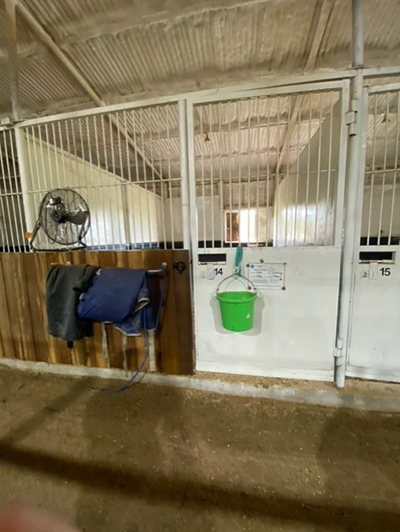
Are the organization's rules, restrictions and warnings (signage) conspicuously posted in easily accessible locations? Yes
Are the organization's emergency contacts, including veterinarian contact information, conspicuously posted in easily accessible locations? Yes
Are human and equine first aid kits easily accessible? Yes
Regarding all shelters where horses are housed including run-in sheds:
Do horses have assigned stalls in the barn/structure(s) or exclusively assigned shelter locations where they are separated from other horses with a barrier? No
How many hours per day, on average, are horses stalled or restricted to these sheltered exclusive shelter locations? 0-3;
How often are the stalls/shelters cleaned, i.e., kept in good repair and free of standing water, accumulated waste, sharp objects and debris? 6-7 Days a Week
Do all stalls/shelters allow horses to lie down, stand up and turn around and provide protection from inclement weather (wind, sleet, rain, snow and extreme temperatures)? Yes
Are stalls/shelters kept in good repair, with adequate ceiling height, and free of standing water, accumulated waste, sharp objects and debris? Yes
Are floors constructed and maintained for both good drainage and traction? Yes
Is there a ventilation and circulation system in place to allow free flow of air to control temperature, and humidity, and to prevent air stagnation? Yes
Is wiring inaccessible to horses and maintained for safety in all areas of facility? Yes
Are fire prevention/protection measures (fire alarms, extinguishers and sprinkler systems) maintained and in good working order? Yes
Is there adequate lighting to ensure safety in all areas of facility? Yes
How many hours per day, on average, are horses turned out:
Equines are out 24/7 except they are brought in if there is inclement weather
Equines are out 24/7 except when they are being trained
Equines are out 24/7 except when they are used for the conduct of the organization's programs
The following describes the pastures at this facility:
A dedicated staff person(s) is responsible for pasture management
All pastures are fenced to prevent escape or injury
Fencing checks, such as broken or missing planks, loose fence posts, exposed or loose nails, detached wires, etc., are done regularly
Pastures have natural protection for equines (i.e., trees)
Pastures have man-made protection for equines (i.e., shelters)
This facility does not have pastures where equines can graze on pasture grass
This facility has a written plan in place for pasture management, which includes guidelines for seeding, fertilizing, irrigation, mowing, dragging, harrowing, manure removal, removal of debris, the control of poisonous plants, and a schedule for cleaning
Barbed wire is used for fencing
Electric fencing is used; electric wires or tape fence are visibly marked
Pastures are rotated
The following describes the turnout areas other than pastures at this facility:
This facility has a written plan in place for the maintenance of turnout areas, which includes a schedule for cleaning, manure removal, and dragging
A dedicated staff person(s) is responsible for the maintenance of turnout areas
All turnout areas are fenced to prevent escape or injury
Turnout areas have man-made protection for equines (i.e., shelters)
Fencing checks, such as broken or missing planks, loose fence posts, exposed or loose nails, detached wires, etc., are done regularly
This facility does not have turnout areas
Barbed wire is used for fencing
Electric fencing is used; electric wires or tape fence are visibly marked
The following policies and procedures are in place at the facility to restrict public access and to keep horses safe:
The property owner, staff member or caretaker lives on the premises and ensures that public access is restricted and is responsible for the security of the facility and equines
There is a mechanism in place to monitor equines overnight
Hold Harmless signs are posted
Entrance gates are locked at night
Visitors are only permitted at specific times
A security guard is present at night
By Appointment Only signs are posted.
No Trespassing signs are posted
Authorized Personnel Only signs are posted
Visitors are only permitted in specific areas
The property is fitted with motion lights
The property is fitted with a security system monitored by police or a professional service
The property is fitted with a security system that is monitored internally by staff (or the property owner)
The perimeter of the property is fully fenced
Equine Care/Emergency Preparedness: STEPS With Horses (*Main) 2026 and 2025 This section is required.
Horse Health Care/Barn Management Records: What system is used to collect and store health/horse care records?
Onsite computer with cloud-based backup storage system
Our organization utilizes a software application to maintain records
The organization utilizes its own system to maintain records
Our organization would use free cloud-based barn management software if available
The following items are consistent with our feed management plan and practices:
Equines are provided with individualized feeding plans, including supplements, according to the equine's age, breed/type, condition, size, work level and any health issues, consisting of nutritious food provided in sufficient quantity and access to adequate natural forage, or be fed daily, or as recommended by the organization's veterinarian
Feed plans are determined in consultation with a veterinarian
Supplement plans are determined in consultation with a veterinarian
Equines are fed grain in groups
Staff and/or volunteers are trained in proper feed measurements and protocols and observed periodically to ensure they are feeding correctly
The feed chart is centrally located and updated as needed
The area(s) where hay, feed, grain, and supplements are stored are kept clean, free of debris and chemicals, and protected from weather and other animals in rodent-proof and mold-proof containers and grain bins
Feed, supplements and hay types are clearly labeled
Water sources, i.e., buckets, troughs, automatic waterers, etc. are kept clean, free of contaminants, debris and chemicals, protected from weather and other animals, and be positioned or affixed to minimize spillage.
Medications are kept in a secure area
Equines are fed grain in individual stalls
Is clean, potable water available at all times for all equines? Yes
Hoof Care: How often is hoof care provided for each equine? Every 4-8 weeks and when an issue arises
Dental Care: How often is dental care provided for each equine? Annually and when an issue arises
Horse checks: How often are equines visually and physically checked by personnel at the facility? Every day or 6 days a week
Our organization has the following parasite and fly/insect control protocols in place, including remedies used to control flies and insects:
Our organization follows the parasite control guidelines of our veterinarian, including fecal testing and de-worming
Fly/Insect Control Remedies:
Fly Traps and Tapes
Fly Spray Repellent
Fly Masks
Fans
The following represent the biosecurity practices in place at facility:
Our organization follows the biosecurity guidelines of our veterinarian
Sick, affected and/or quarantined equines do not have contact with other equines or other animals
Staff are trained in best practices related to biosecurity
Volunteers are trained in best practices related to biosecurity
Sick, affected and/or quarantined equines are cared for last if the caretaker must also care for healthy equines
Restricted access signs are posted at primary points of access to sick, affected and/or quarantined equines
Hand sanitizers are available at all primary points of access to sick, affected and/or quarantined equines
Footbaths are available at all primary points of access to sick, affected and/or quarantined equines
Manure and bedding from sick, affected and/or quarantined equines is removed from the facility - not put in open air piles, and not spread on pastures
Quarantine areas, such as stalls, aisle ways, paddocks, and common areas, are cleaned (and needed, disinfected) after conclusion of the quarantine.
Trailers/vans used by sick, affected and/or quarantined equines are cleaned and disinfected after each use and cleaning takes place away from where equines are sheltered
Equipment used by sick, affected and/or quarantined equines is not shared
Equipment used by sick, affected and/or quarantined equines is cleaned of organic debris and disinfected after each use
Latex gloves, or equivalent gloves, are worn when working with sick, affected and/or quarantined equines
The organization has a written biosecurity plan
A specific individual is trained and assigned to care for sick, affected and/or quarantined equines
Equines are not quarantined on arrival.
Additional information on biosecurity:
STEPS is an organization leasing a private pasture space at the 4 Hearts Ranch facility (a separate business entity with separate staffing). Our equines stay in a closed herd and do not share fence lines with other equines boarded at the facility. Additionally, our reserved stalls (if used) have solid walls and do not allow for contact between our equines and other equines boarded at the facility. The facility follows the biosecurity security guidelines of its veterinarian. STEPS has access to use the ranch's quarantine pen if we were to need to quarantine a sick, affected, and/or other quarantined equine so that it cannot have contact with our other equines. We clean our own stalls to keep free of debris and cobwebs but cannot control the condition of other boarders' stalls.
The following represent the manure removal practices in place at facility:
Manure is piled in an area where equines are not located
Manure piles are composted or spread on pastures
Our organization adheres to the manure management guidelines set by the state, local authorities, and/or our organization's veterinarian
Manure is stored in dumpster(s)
Manure piles are covered
Manure is hauled, sold or given away
The following steps are taken to help staff and volunteers readily identify each horse on the property:
A notebook or binder with photos and information on each equine is easily accessible
Equine photos and profiles are available on the website
Staff and volunteers are provided with an information packet with equine profiles, including photos and detailed descriptions
Staff/volunteers are provided training on conformation, markings, colors, and breeds
Team leaders work with new staff/volunteers until they are able to identify the equines
Equines are assigned the same exclusive stall/shelter location each day
Name plates are located on the stall/shelter location
Photos are located on the stall/shelter location
Equines wear halters with nametags
A map/diagram is posted showing the location of each equine with equine names and photos
Our organization has the following policies and procedures in place pertaining to tack, apparel and equipment:
Saddles are shared
Saddle pads are shared
Bridles are shared
Bits are shared
Blankets are shared
Sheets are shared
Turnout apparel is shared
Blankets, sheets and turn out apparel are fitted and utilized for each equine appropriate to the equine's needs and the weather conditions
Blankets, sheets and turn out apparel are cleaned regularly as needed
Halters are shared
Riding Tack is cleaned only when needed
Riding Tack is inspected for overall working condition before each use by trained personnel
Riding Tack is assessed for fit before each use by trained personnel
Riding Tack is assessed for fit by trained personnel when an equine's body condition changes
Riding Tack is assessed for fit by trained personnel when an equine's disposition changes
This facility enlists the services of a professional saddle fitter at least once a year
Assigned riding tack is clearly labeled
Helmets are shared
Helmets are cleaned/disinfected after each use
Helmets are replaced after a fall
Helmets are replaced at least every five years.
All equines have specifically assigned apparel, equipment and tack (saddles/bridles if ridden) that is not shared
Riding Tack is always cleaned after each use
Riding Tack is always cleaned at least weekly
Riding Tack is stored in a climate-controlled location
No equines are ridden; saddles, bridles, etc. not applicable.
Emergency Preparedness: STEPS With Horses: *Main This section is required.
The following plans, policies, and procedures are in place at the facility to handle emergencies and address weather related issues, fire safety procedures, and/or any additional hazardous scenarios the facility could potentially experience:
The facility owns or has access to a generator
The facility maintains at least two weeks of hay, feed, shavings and medications
The facility collects and maintains medical information from staff, volunteers, and clients
The facility maintains appropriate liability and/or workers' compensation insurance
The organization has a written emergency preparedness/safety plan (EPP)
Emergency procedures are posted prominently
Local fire department and/or the state's emergency planning department procedures
Medical emergencies for clients, staff, and volunteers
Medical emergencies for equines
Evacuation plans
Power outages
Fire
Natural Disasters - thunderstorm, hurricanes, earthquakes, tornados, etc
Terrorist attacks
Protocols to notify emergency personnel
Building/facility exit plans
The facility follows the specific procedures to help PREVENT emergency situations:
Smoking is strictly prohibited
Hay is stored away from permanent or temporary structures where equines are stalled
Permanent or temporary structures where equines are stalled are kept free of dust, cobwebs, trash, cleaning rags, and other flammable items
Aisles and doorways are kept clear
NO SMOKING signs are posted prominently
Heaters with automatic shutoff settings are used
How often are the following checked or performed?
Fire Extinguishers are checked: Quarterly
Smoke detectors are checked: Quarterly
Fence lines are checked: Daily
Turnout Areas are checked: Daily
Sprinkler systems are checked: Not at all/NA
Fire drills are conducted: Annually
Review of safety protocols with staff are conducted: Monthly
Review of safety protocols with volunteers are conducted: Monthly
The Emergency Preparedness Plan is reviewed and updated: Semi-annually
Equine Transportation: 6= Onsite: 2 (1 + 1) + Offsite: 4
2-horse van/trailer with truck:
1 Owned onsite
3-horse van/trailer with truck:
1 Access onsite but not owned 2 Access offsite;
4-horse van/trailer with truck:
1 Access offsite;
6-horse van/trailer with truck:
1 Access offsite;
© Copyright 2018 EQUUS Foundation 2353 4.00